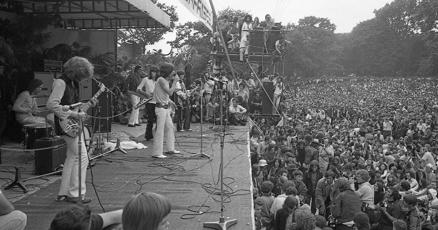Met Museum and Rolling Stone's Mick Taylor Clash Over Historic Guitar
Former Rolling Stones guitarist Mick Taylor challenges the Metropolitan Museum of Art's ownership of a historic 1959 Gibson Les Paul guitar, sparking debate over cultural heritage and musical artifacts.

The disputed 1959 Gibson Les Paul 'Keithburst' guitar at the Metropolitan Museum of Art
Iconic Les Paul Guitar Sparks Ownership Dispute Between Rock Legend and Museum
In a contentious dispute echoing the turbulent history of rock 'n' roll, former Rolling Stones guitarist Mick Taylor has challenged New York's Metropolitan Museum of Art over the ownership of a legendary 1959 Gibson Les Paul guitar, highlighting the complex intersection of cultural heritage and musical history.
The instrument, renowned for its distinctive 'starburst' finish and dubbed the 'Keithburst,' was recently donated to the Met as part of a landmark collection of 500 vintage guitars by billionaire investor Dirk Ziff. The donation's significance mirrors the cultural impact of other British rock legends whose instruments have become museum pieces.
Historical Significance and Contested Ownership
The guitar's provenance includes performances by Keith Richards during the Rolling Stones' breakthrough appearance on 'The Ed Sullivan Show' in 1964, making it a crucial artifact in broadcasting and cultural history. Guitar legends Eric Clapton and Jimmy Page also played the instrument, enhancing its historical value.
Disputed Timeline and Documentation
Taylor claims the guitar disappeared during the recording of 'Exile on Main St.' in 1971 at Richards' French villa. However, the Met's records indicate a different ownership trajectory, showing the guitar was transferred to producer Adrian Miller that same year. This dispute over cultural artifacts reflects broader issues of artistic heritage and institutional custody.
Current Status and Future Implications
The Met plans to feature the guitar in a new gallery dedicated to American guitars, while Taylor's team calls for independent expert examination. The museum maintains complete documentation of the instrument's ownership history, creating a standoff between institutional authority and personal claims.
'This guitar has a long and well-documented history of ownership,' stated Met spokesperson Ann Ballis, underlining the museum's position on the matter.
Thomas Reynolds
Correspondent for a London daily, specialist in British foreign policy and transatlantic issues.
